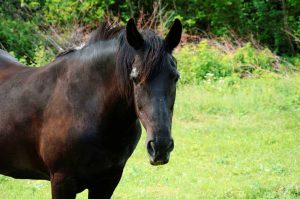
How To Manage a Horse With Seasonal Allergies
Here’s what you can do to help your allergy-prone horse prepare for the onslaught of seasonal allergens.

Here’s what you can do to help your allergy-prone horse prepare for the onslaught of seasonal allergens.

Learn how allergies happen, how they affect your horse’s body, and how to avoid or treat them.

Follow the steps in this visual guide to relieve your horse’s clinical signs of insect bite hypersensitivity and prevent future flare-ups. Sponsored by Kinetic Vet.

Explore the methods used to diagnose food-related issues in horses and effectively manage their clinical signs.

There’s nothing appealing about this seasonal skin condition. Here’s what experts know about managing, treating, and preventing sweet itch in horses.

One expert explains why horses get hives and how they can be treated.

Do you have a horse with insect bite hypersensitivity, contact dermatitis, or respiratory allergies? Learn how to make him more comfortable. Sponsored by KineticVet.

Are you and your horse ready for spring? Check off all the items on this list to prepare for a healthy, successful riding season.

Horse show environments can put sport horses at risk for developing skin problems. Learn what causes common skin issues and how to return horses to top form.

Experts share the causes of and treatment options and prevention strategies for this uncomfortable skin reaction in this article from the Summer 2023 issue of The Horse.

Dr. Aja Harvey explains why an old horse might suddenly become very itchy, and how owners can prevent it.

Miniature Horses with allergies can be challenging to manage and might have different dietary needs than their larger counterparts.

Dr. Susan White describes options for treating laminitis-prone EMS horses that also suffer from allergies.

Veterinary intervention can make itchy horses more comfortable and keep allergies under control. Sponsored by Kinetic Vet.

In this episode learn about treating sweet itch, dealing with hair loss in itchy horses, and managing EMS and allergies, among other topics. Sponsored by KineticVet.

Alleviating these unsightly skin lesions proves challenging in many cases. Sponsored by KineticVet.
Stay on top of the most recent Horse Health news with
© 2022 Copyright Statement dolor sit amet, consetetur sadipscing User Terms, sed diam nonumy eirmod tempor invidunt ut labore et dolore magna aliquyam erat, sed diam voluptua. At vero eos et accusam et justo duo dolores et ea rebum. Stet clita kasd gubergren, no sea takimata sanctus est Lorem ipsum dolor sit amet.
"*" indicates required fields